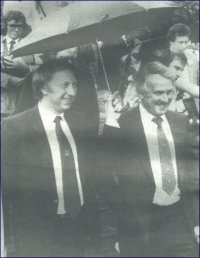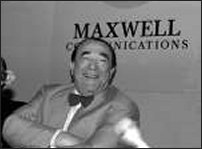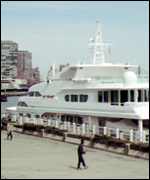|
Newsletter
June 2002
Sorry, Arthur
In 1990, the Daily Mirror, then edited by Roy Greenslade, claimed that at the height of the miners' strike NUM president Arthur Scargill and General Secretary Peter Heathfield had taken money raised for strikers as well as accepting money from Libya's Colonel Gadaffi. But now the truth can be revealed. After twelve years
of silence Roy Greenslade finally apologised in the June 27th edition
of the Guardian. This is how he sums up at the end: "I am now convinced that Scargill didn't misuse strike funds and that the union didn't get money from Libya. I also concede that, given the supposed wealth of Maxwell's Mirror and the state of NUM finances, it was understandable that Scargill didn't sue....I can't undo what has been done, but I am pleased to offer the sincerest of apologies to Heathfield and to Scargill, who is on the verge of retirement. I regret ever publishing that story. And that is the honest truth." Here is the article in full: Roy Greenslade On March 19 this year the highest court in France, the Cour de Cassation, ordered Roger Windsor, former chief executive of the National Union of Mineworkers, to repay a debt of £29,500. The judgment went unreported in Britain, as did an NUM press release more than a month later that celebrated the court's ruling. Yet this case – and Windsor's humiliation – deserve the widest possible audience because they are the culmination of a deplorable saga which goes some way to vindicating a wronged man: NUM president Arthur Scargill. Wronged by the press in general, by the Daily Mirror specifically and, since I was then its editor, by me. We journalists seem to find it impossible to apologise for what we have written and I know, sadly, that some old friends and colleagues won't appreciate this mea culpa. But lingering embarrassment is far outweighed by my heartfelt delight in being able, at last, to put the record straight by saying sorry. Twelve years ago, the Mirror published a series of stories which genuinely deserved the adjective sensational. The most damaging "fact", headlined with a certainty that brooked no contradiction, was that Scargill had paid off the mortgage on his house with money donated by Libya. The main story claimed that at the height of the 1984-5 strike, Scargill had counted out £70,000 from money supposed to go to suffering strikers to clear his £25,000 home loan from the NUM, along with those of two other officials, the then general secretary Peter Heathfield and the then chief executive, none other than Roger Windsor. Running in parallel were several other cloak-and-dagger tales about £1m donated by Russian miners, movements of funds through Swiss and Irish banks and boxes of cash being driven through the night. There was a cast list of exotic characters, including Libya's Colonel Gadafy, a Pakistani shopkeeper in Doncaster called Altaf Abassi and Scargill's former driver-cum-minder Jim Parker. Almost as exotic was the Mirror man responsible for obtaining the original tips, Terry Pattinson – the testy and excitable industrial editor. He was first approached by Parker, who had fallen out with Scargill, in July 1989. Very soon after, he was separately contacted by Windsor, who had quit the union and said he had a terrific story to sell to the paper. My predecessor as Mirror editor, Richard Stott, then oversaw months of an investigation code-named Operation Cyclops. Cash deals of £50,000 were agreed with Parker and Windsor. Contracts were signed. The investigation was said to be nearing completion when Stott was deposed by Mirror proprietor Robert Maxwell in my favour. When I took over in February 1990, Maxwell gleefully confided that the paper had a huge, hush-hush scandal in the pipeline. But my heart sank when I realised the subject: I had no animus against Scargill (quite the reverse); I thought it inappropriate for the left-of-centre Mirror to target a trade union leader; but, most important, I thought the copy presented to me was both impenetrable and lacking in substance. With the NUM's assets under sequestration during the strike, it had been entirely understandable for Scargill and his executive to use subterfuge to protect their funds. I had donated money to street collectors shaking buckets and I didn't really expect it to reach strikers through official union routes. To help me understand what Cyclops was about, I assigned two experienced reporters – Frank Thorne and Ted Oliver – to go over every detail of Pattinson's story, and to re-interview Parker and Windsor. It was obvious Pattinson had no love for Scargill, and I wanted to make sure this didn't cloud his judgment. He also detested the involvement of Thorne and Oliver, and there were several rows between the trio. After one noisy pub argument, I had to placate the fractious Pattinson by pretending to admonish the other two. This incident alerted me to the most farcical situation of all: the great Scargill story was no secret. Five months before I became editor, Scargill had got wind that something was up, and his union's paper ran a story asking: "Has Robert Maxwell's Daily Mirror launched a special 'smear' campaign against the NUM? And is its prime target union president Arthur Scargill?" After a couple of weeks, an industrial correspondent from a rival paper asked me when we were going to run our Scargill scoop. Not only did half of Fleet Street appear to know, I then discovered that Central TV's The Cook Report was so far down the road on the same investigation that its intrepid reporter, Roger Cook, was already planning his script. I could and should have abandoned the whole project at that point. But I respected the reporting talents of Thorne and Oliver who, despite their disagreements with Pattinson, had come to believe in the veracity of his informants' stories. By this time our main witness, Windsor, was living in France and I sent the trio to see him, to go over every point in his allegations. He demanded a further £30,000 (eventually paid to him) and proved difficult to deal with. They did have reservations about him, due in part to his reluctance to return to Britain, but on balance they believed him. The central revelations concerned the mortgage repayments and the fact, always previously denied, that the NUM had received money from Libya. Each of the claims was sensational. Linked, they were dynamite. But was Windsor telling the truth? Parker couldn't really corroborate either claim. He spoke mainly about collecting boxes of cash from British trade union leaders. Windsor named Abassi as the Libyan link man who given him the money and, after a little persuasion, Abassi confirmed to Thorne and Oliver that he had given £163,000 to Windsor from Libyan sources. There was still a problem. Windsor was the only witness to the alleged dividing of the money to repay home loans. With the Cook programme pressing to broadcast and requesting our help in return for telling us what they knew, one of the most extraordinary moments in my journalistic career happened. Out of the blue, Steve Hudson, the finance officer whom Windsor had named as the other man in the room when the money was counted out, phoned one of our reporters. Hours later, he turned up in my office to give a taped interview in which he confirmed every word of Windsor's account. He didn't ask for payment and spoke under no duress. Despite my earlier misgivings, I could no longer turn a blind eye to Cyclops. Throughout these weeks I had been editing a paper owned by the world's most intrusive proprietor. But I didn't tell Maxwell how the Scargill investigation was progressing until suddenly informing him that we had to publish on March 5 to coincide with that evening's Cook Report. He was furious – Maxwell hated surprises – and was even more bad-tempered when the Sun preempted our scoop with a story suggesting that Scargill was facing a controversy over Libyan and Russian money. After we published, Maxwell foolishly hogged the TV limelight, reinforcing Scargill's belief that Maxwell was part of a plot. We sent a set of written questions to Scargill but, nervous of an injunction, didn't mention the mortgage. That was an ethically suspect decision, breaking a time-honoured tradition in which people are given a chance to answer press allegations. I expected Scargill to sue. Pattinson, convinced by every allegation, was sure he wouldn't. He was right about that. Scargill confined himself to a statement decrying our "vicious lies". The series ran all week and one evening Maxwell asked me if I was entirely happy with the story's provenance. I knew immediately what he meant. Had the Daily Mirror been duped as part of a secret service plot to discredit Scargill? Was Windsor, if not an agent of MI5, being manipulated by one of its officers? I discussed this with the trio and they dismissed any such notion. Thorne and Oliver didn't much like Windsor, but they thought him an unlikely recruit to MI5. They pointed to the interlocking jigsaw in which Parker, Abassi, Windsor and Hudson had played their parts and, as I would repeat endlessly in the following months and years, if it wasn't true why hadn't Scargill sued for libel? Even when Gavin Lightman QC, who held an inquiry at the NUM's prompting, ruled that the mortgage story was "entirely untrue" I was relaxed – though I was badly shaken by Hudson changing his story. Most of us moved on. I departed from the Mirror. Maxwell departed from this earth. Peter Heathfield retired in 1992, distraught at the slur on his name. But Scargill, similarly outraged, fought on. The most important enduring court action was launched by the French-based International Energy and Miners' Organisation (IEMO), which sought to recover from Windsor the £29,500 he had admitted receiving from union funds. In 1994, the IEMO won its case to recover the money when a French court decided that despite his denials, Windsor had signed a mortgage deed and – according to forensic handwriting experts – his wife's signature, which strongly resembled his own, had been forged. Four years later, two courts of appeal in Bordeaux reaffirmed that judgment. The Cour de Cassation was Windsor's last hope. Now claiming insolvency, he faces a bill for the loan plus interest, costs and damages estimated at £250,000. I left a phone message at Windsor's home in central France this week. He did not reply, but his London-based lawyer called in his stead. I repeated that I wished to speak to Windsor, who didn't call back. Similarly, Hudson – now the director of finance for the coal industry social welfare organisation – didn't return my call. So was Windsor working for MI5? He strenuously denies it and recently sued the Daily Express for asserting that he was. Dame Stella Rimington, the former head of MI5, was asked directly by the Guardian last September whether he was an MI5 agent. Choosing her words carefully, she replied: "It would be correct to say that he, Roger Windsor, was never an agent in any sense of the word that you can possibly imagine." It looks as though the mystery behind Windsor's decision to make such sweeping allegations against his former union colleagues may never be solved. It has brought him to ruin and the NUM estimates it has cost the union £750,000 to fight court battles since the Mirror's series. I am now convinced that Scargill didn't misuse strike funds and that the union didn't get money from Libya. I also concede that, given the supposed wealth of Maxwell's Mirror and the state of NUM finances, it was understandable that Scargill didn't sue. Nothing I have said should be taken as criticism of the Mirror trio: we were all taken in. I can't undo what has been done, but I am pleased to offer the sincerest of apologies to Heathfield and to Scargill, who is on the verge of retirement. I regret ever publishing that story. And that is the honest truth. ROBERT MAXWELL
Just to remind you of who was behind this smear campaign, here is a brief biography of Mirror owner Robert Maxwell. In seeking to explain Robert Maxwell's actions in later life, many commentators point to the extreme poverty and deprivation of his childhood. The media mogul once claimed that he did not have a pair of shoes until he was seven. But billions of people worldwide live in similar, or even greater poverty, without turning into Maxwells so this can be no explanation for what he became. Born in extreme poverty in the Carpathian mountains in then Czechslovakia, Jan Ludvik Hoch – as he was then – succeeded in building a publishing empire that spanned the world. His death in November 1991 at the age of 68 initially prompted a series of eulogies for his achievements. But in the weeks that followed and as more news emerged of the true state of his company's finances and his critics gained courage now that their fiery and unpredictable nemesis was dead – he was damned by press and public alike for the way he ran his businesses.
His body was later recovered from the sea off the Canary Islands after he had been reported missing from his private yacht, the Lady Ghislaine, but no one has yet cleared up the mystery of his death. In death, as in life, he attracted controversy and conspiracy theories abound that the drowned body found was not Maxwell. The manner of the inquiry by the Spanish authorities and the speed of his burial in Jerusalem within two days of his death under Jewish custom only fuelled those theories. In the shadow
of the concentration camp Describing himself as "self educated", he spoke several languages and by the end of war, he had emerged as a British army officer with commendations for bravery. After the war, he was located in Berlin, where he decided to publish scientific journals and set up Pergamon Press before moving to Britain.. Political beast As one of the few business men who liked to proclaim his socialism, Maxwell stood for the Labour Party in Buckinghamshire in 1964 where he won and held his seat until 1970. His relationship with the Labour party was an uneasy one, with the political party wary of angering the man who owned newspapers sympathetic to Labour principles. Many people cowered from criticising him, not least because of his readiness to confront his critics in the libel courts. First DTI inquiry In 1969, Maxwell agreed a takeover bid for Pergamon from Leasco, an American financial and data processing group. However, when Leasco questioned Pergamon profits, the talks fell apart and Maxwell was subjected to a DTI inquiry. The inspectors found that Pergamon's profits depended on transactions with Maxwell family private companies. The DTI report said: "We regret having to conclude that, notwithstanding Mr Maxwell's acknowledged abilities and energy, he is not in our opinion a person who can be relied on to exercise proper stewardship of a publicly quoted company." Few business people could recover their career after such comments, let alone carry on to build a global publishing company. Back in business Maxwell had long hoped he would be able to take over a national newspaper, but had twice lost out to Rupert Murdoch, who succeeded in taking over the Sun and the News of the World. He got his chance to run a national newspaper when he bought Mirror Group Newspapers in 1984 from Reed International. The purchase of America's Macmillan publishers dragged his company further into debt. In 1991, he floated MGN as a public company, desperate to raise cash because the rest of the company was veering towards bankruptcy with debts of over £2bn. Exactly how desperate he had become was not clear until after his death, when it transpired that he had taken massive amounts of money from pension funds to keep his companies afloat and boost the share price. Despite all his shady dealings and bullying manner, Labour leaders were keen to court him and accept his hospitality. He was a forerunner of 'New Labour' – which he would have loved, surely – and its current obsession with gaining the favours – and donations – of the rich, famous and often dubious in society. Robert Maxwell:
Key Dates
|
|||||||||


